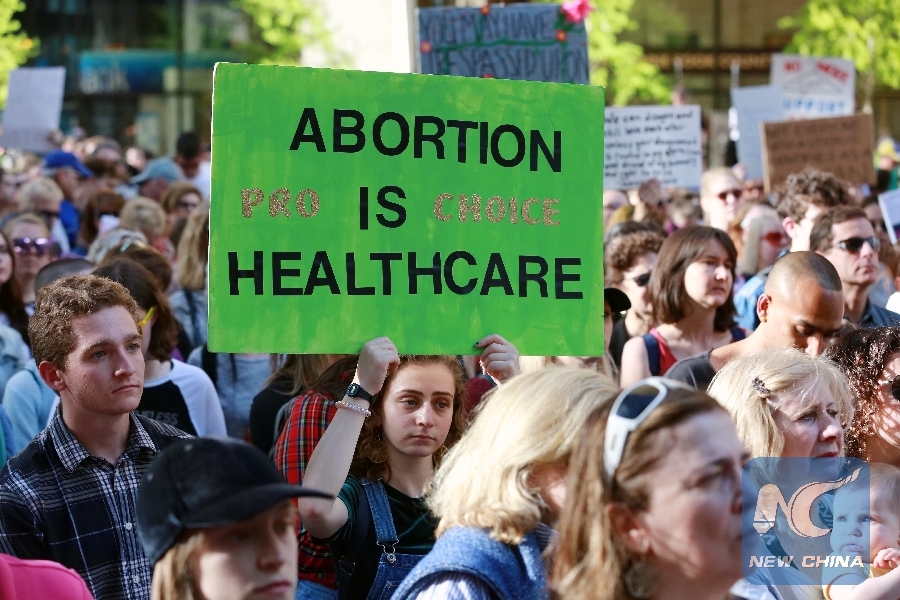
People participate in a protest against abortion ban at Daley Plaza in downtown Chicago, the United States, on May 23, 2019. (Xinhua/Wang Ping)
by Matthew Rusling
WASHINGTON, May 30 (Xinhua) -- Abortion has vaulted to the forefront of issues in the lead up to the 2020 U.S. presidential elections, and experts said the issue may well become the Gordian knot in the race, dragging out the imminent fight between Democrats and Republicans.
"The abortion issue will be major during 2020," Brookings Institution Senior Fellow Darrell West told Xinhua.
"(The issue) helps each side mobilize its voters. Pro-life voters feel there is no respect for the sanctity of life, while pro-choice voters feel their hard-earned rights are under attack," West said.
"There likely will be a big turnout from each side of that issue. Its importance shows how far apart the two parties have become and the way in which each has very different approaches to the issue," West said, noting the widening ideological gulf between each side, as well as their constituents.
Earlier this month, Kay Ivey, governor of the U.S. state of Alabama, signed a new law that would ban all abortions, except in cases in which the mother's life is in danger, in the latest challenge to the 1973 landmark Roe v. Wade case that ruled that women have a right to have an abortion.
The Alabama law would make it a felony for a doctor to perform an abortion, with the possibility of 99 years of imprisonment. Even victims of rape and incest would not be permitted to terminate their pregnancies.
The ban is the latest in a trend toward more restrictive abortion policies, with the U.S. states of Kentucky, Ohio, Georgia and Mississippi recently creating similar bans. Experts say all this is part of a GOP concerted effort to push the issue up to the U.S. Supreme Court, where anti-abortion supporters hope the court will strike down Roe v. Wade.
For their part, conservatives say the trend toward restricting abortions is a reaction to recent moves in states such as New York and Virginia to relax restrictions on late-term abortions.
BATTLE LINES BEING DRAWN
Democrats' national leadership has already weighed in on the Alabama law, signaling that the issue will be a national one in the 2020 elections.
House Leader Nancy Pelosi said earlier this month that the law cannot "be allowed to stand." Former presidential candidate Hillary Clinton tweeted the "abortion bans in Alabama, Georgia, Ohio, Kentucky, and Mississippi are appalling attacks on women's lives and fundamental freedoms."
Former presidential candidate Bernie Sanders tweeted that abortion is a "constitutional right," saying "the attack on women's rights is happening in Alabama, Georgia and across the country, and we must fight it everywhere."
West said "both sides will use that issue to mobilize their base voters, especially evangelical people," referring to the many deeply religious people that comprise U.S. President Donald Trump's base.
"Much of the opposition and resistance to Trump has been among women, and particularly older women," Christopher Galdieri, assistant professor at Saint Anselm College, told Xinhua, explaining why the abortion issue has the potential to impact the 2020 elections.
With Democrats seeing many gains among suburban women in the 2018 Congressional elections, there could be more movement in that direction if more states enact seriously restrictive access to abortion, Galdieri said.
Democrats say the abortion issue will galvanize voters in the U.S. states of Colorado and Maine -- states that Trump lost in the 2016 elections. But in states such as Alabama, Georgia, Arizona and North Carolina, Democrats will need to walk a fine line -- motivate their base without offending more moderate voters they need to clinch the Senate.
LEGAL CHALLENGES COINCIDE WITH POLITICAL FIGHT AHEAD
TV news personality and Republican strategist Ford O'Connell told Xinhua that the new law in Alabama, as well as similar laws in other states, are a test-case, signed into law so they'll get pushed up to the Supreme Court in hopes that Roe v. Wade will be overturned.
O'Connell added that the spate of anti-abortion laws being passed in several states is a reaction to what many conservatives view as radical and immoral laws being pushed in states such as New York and Virginia. Such legislation seeks to make abortion legal even in the third trimester. Social conservatives, particularly evangelicals, which represent a large chunk of Trump's base, have strong views against such laws.
West said legal challenges will find their way through the courts and will likely end up before the Supreme Court in 2020, "just in time for the presidential election."
Galdieri said conservatives are seeing an opportunity, as the balance of the U.S. Supreme Court has recently changed. Former Supreme Court Justice Anthony Kennedy has been replaced by the right-leaning Brett Kavanaugh. Moreover, President Trump has appointed a number of more conservative judges in the lower courts.
Dan Mahaffee, senior vice president and director of policy at the Center for the Study of Congress and the Presidency, told Xinhua that state-level GOP leaders think the new balance in the Supreme Court represents the best opportunity to challenge Roe v Wade, as well as drive turnout among religious voters.
However, the move could backfire, Mahaffee added.
"At the same time, it further alienates women voters that have turned against Republicans in increasing numbers," Mahaffee said.
A May 2018 Gallup poll found that 60 percent of Americans believe abortion should be legal during the first trimester, and merely 13 percent believed women should be allowed to terminate their pregnancy during the third trimester.

